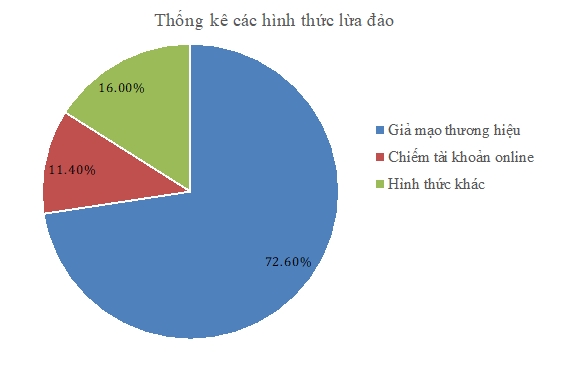What should people do when being scammed online?
- Tram Ho
Records from the Vietnam Information Security Warning portal show that in 2022 there were more than 12,935 cases of online fraud, with 3 main types of fraud including: brand counterfeiting, appropriating online accounts and other forms of fraud. other combinations. The scam to steal personal information is also a stepping stone to continue the scripting of financial fraud.

Statistics of frauds in 2022 (Source: Vietnam Information Security Warning Portal)
According to the Department of Information Security (Ministry of Information and Communications), one of the main causes of the increasingly complex online fraud is identified from users’ awareness. Besides technical solutions, propaganda, dissemination and awareness raising to equip each individual with basic knowledge and skills to ensure information security in cyberspace is a key factor. helping to create a safe Vietnamese cyberspace, contributing to accelerating the digital transformation process and developing digital socio-economic infrastructure in a sustainable way.
The Information Security Administration has issued a warning about 24 types of scams taking place in Vietnam’s cyberspace, targeting target groups including: the elderly with 15 regular scams; children with 3 forms of online lures; students/youth with 13 forms; workers/employees, office workers were lured with 19 forms of fraud…

Some forms of fraud in cyberspace that people need to pay attention to (Source: Department of Information Security)
If you have been caught in the trap of scammers, people need to stay calm and follow the instructions below to avoid further damage.
If you have been scammed, follow these steps:
– Do not continue to send money and block all communications from scammers.
– Contact your bank and financial institution immediately to report the scam and ask them to stop all transactions.
– Collect and save evidence, make a denunciation and send it to the police office of the place of residence.
– Warn your family and friends about this scam so they can watch out for possible further scams.
– Monitor and update information, situations and signs of online fraud at the National Cyberspace Portal: khonggianmang.vn .
If you’ve transferred money to a scammer in any of these ways, here’s what to do:
– Credit/debit card: Contact your bank immediately to report the scam and ask them to stop all transactions.
– Gift card: Report to the card issuer.
– Bank transfer: Report to the bank transfer company or bank you are using.
– Money Transfer App: Report to the app provider (seller or developer, not app store).
– Cryptocurrencies: Report to the platform or company you used to deposit as crypto is not recoverable.
– Cash: If you’re mailing or delivering, contact the post office or delivery service used to see if they can intercept the package.
– Unauthorized wire transfers: If a scammer has transferred money without your approval, immediately notify your bank to request that your account and transactions be frozen.
– Collect and save evidence, make a denunciation and send it to the police office of the place of residence.
– Monitor and update information, situations and signs of online fraud at the National Cyberspace Portal: khonggianmang.vn .
If your personal information (name, phone number, email, address, identification) has been leaked due to a data breach, here’s what to do:
– Report data breaches to your financial institutions.
– Create a new stronger password, making sure you have never used it before. If you used a leaked password anywhere else, change it there.
– Watch out for suspicious communications, block or don’t reply to anyone you don’t know, and don’t click on any suspicious links.
– Keep a close eye on your bank account.
In the event that a scammer pretends to be someone from your Internet or phone provider, they say you have a technical problem and ask for access to your device. The scammers then infect it with viruses to steal your passwords and financial information. Here’s what to do:
– If scammers gain access to your computer: Update your security software and scan for viruses. Delete anything identified as problematic and reset your password.
– If scammers gain access to your phone: Report it to your phone service provider. Update security software and scan for viruses. Change your password or pin, block scam calls, and consider changing your phone number.
You can also ask an IT specialist to check your equipment in person.
You can immediately contact agencies, organizations and businesses about network security and information safety:
1. Department of Cybersecurity and High-Tech Crime Prevention and Control (A05), Ministry of Public Security; or the Criminal Police Department (C02) under the Ministry of Public Security.
In each locality, contact the Department of Cybersecurity and High-Tech Crime Prevention (PA05).
2. Department of Information Security (AIS), under the Ministry of Information and Communications. The Information Security Administration is the state management agency and law enforcement agency on information security, phone 024 3209 6789; email ais@mic.gov.vn.
3. Cyber Command (Command 86), Ministry of National Defense of Vietnam.
In addition, the Department of Information and Communications of the provinces and centrally-run cities in 63 provinces/cities is an extension arm of the Ministry of Information and Communications in the provinces and cities.
5. Vietnam Information Security Association (VNISA), phone number: 024 62901028; email info@vnisa.org.vn.
6. Vietnam’s information security enterprises: Bkav, VNPT Cyber Immunity, Viettel Cyber Security, CMC Cyber Security, FPT IS, HPT, MISOFT and VNCS…
7. Coalition to raise awareness and skills to ensure information security for people in cyberspace, chaired by the Information Security Administration (AIS) and Vietnam Information Security Association (VNISA), coordinated with 8 founders VNPT, Viettel, MobiFone, CMC, Bkav, VNG, TikTok and Coc Coc.
Source : Genk
